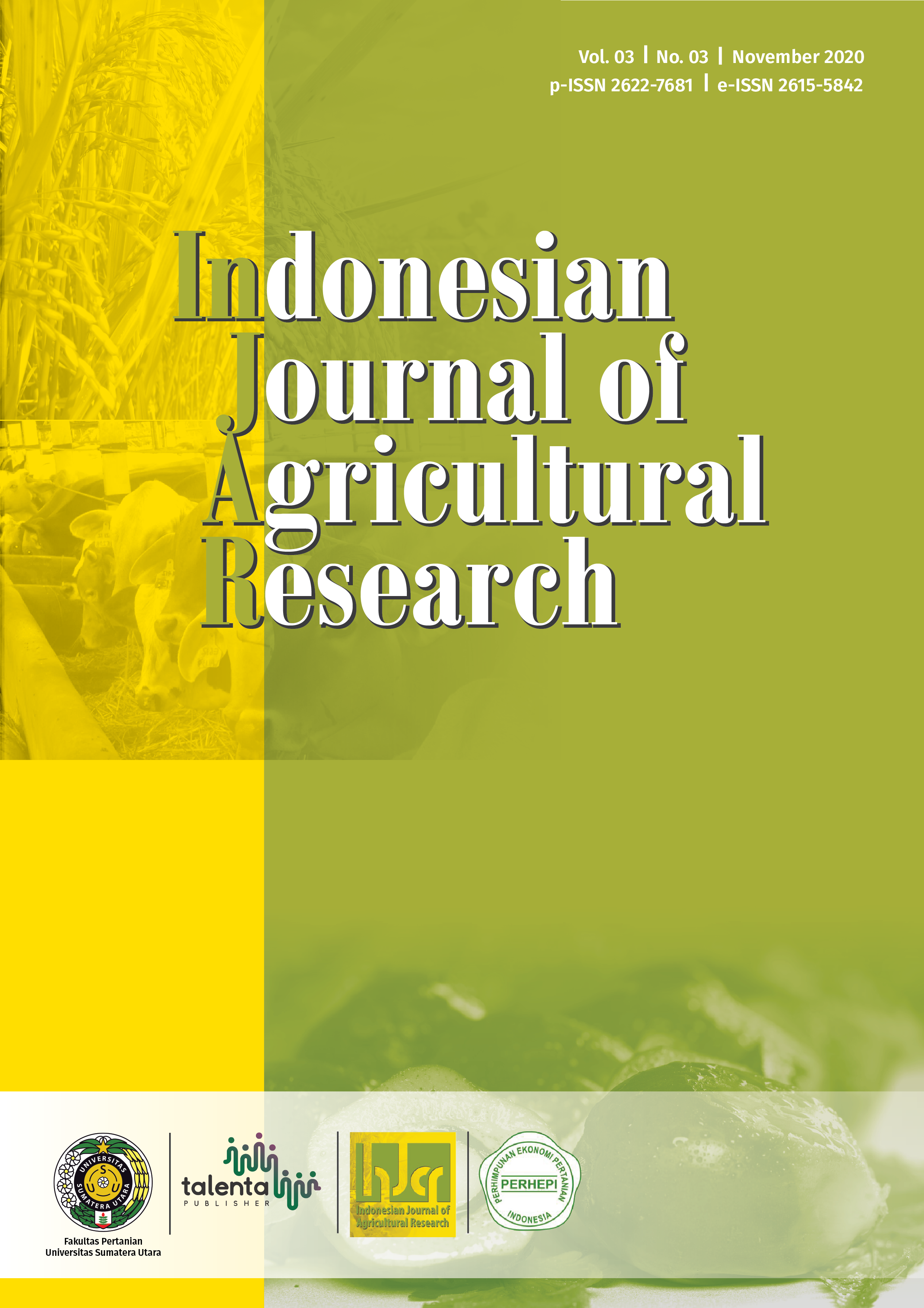Organoleptic Test of Salted Eggs with Addition of Herbal Plants
DOI:
https://doi.org/10.32734/injar.v3i3.4286Keywords:
organoleptic test, salted egg, broiler, herbal plants.Abstract
The addition of salt and herbal plants such as bay leaf (Eugenia polyantha) and lemongrass (Cymbopogon citratus DC) extacts can extender the shelf life and increase the flavor of the salted eggs. The purpose of this study was to determine the quality of eggs produced from using the herbal plants in terms of the organoleptic testing. This research used eggs from laying hens with salted egg making media consisting of rubbing ash plus salt, supplemented with bay leaf (Eugenia polyantha), lemongrass (Cymbopogon citratus DC), with storage period of 10 days. Organoleptic test results showed that the addition of bay leaves and lemongrass to the production of salted eggs, did not significantly improve the quality of salted eggs produced. The lack of storage time in the egg marinating process led to the incomplete, in salt water absorption into the egg. It is concluded that the addition of bay leaves and lemongrass to the media of making salted chicken eggs did not have a significantly different effect on the organoleptic quality of the salted eggs.
Downloads
References
A. W. Sukma, “Changes in hedonic quality of roasted salted eggs during storage,†Skripsi, Fakultas Peternakan dan Pertanian, Universitas Diponegoro, Semarang, 2012.
E. Rahmawati, “Addition of kitchen lemongrass extract (Cymbopogon Citarus Dc) against physical, chemical and organoleptic properties of salted eggs,†Skripsi, Fakultas Teknologi Pertanian Universitas Semarang, Semarang, 2019.
A. Purwati, “The nine superior medicinal plants resulted from the 2004 clinical trial by the POM,†[Online]. Available: http://www.beritabumi.or.id. [Accessed: Jan. 2, 2020].
R. G. D. Steel and J. H. Torrie, Statistical Principles and Procedures (translated from: Principles and Procedures of Statistics, translator: B. Sumantri). Jakarta: PT Gramedia,1993.
I. M. Mustika, A.W. Puger, and T. I. Putri, Factors Affecting Egg Production and Quality. Buku Ajar, Fakultas Peternakan Universitas Udayana, Denpasar, 2014.
H. Oktaviani, N. Kariada, and N. R. Utami, “Effect of salting on nutritional content of duck eggs given with shrimp waste,†Jurnal Unnes of life Sciense, vol. 1, no. 2, pp. 106-112, 2013.
A. Harianto, “Process of making salted eggs,†Jurnal Peternakan, Jakarta. 2016.
H. Sastrohamidjojo, Essential Oil Chemistry. Yogyakarta: Gajah Mada University Press, 2004
A. A. Budiman, Hintono, and Kusrahayu, “The effect of old roasting of salted eggs after boiling on NaCl Levels, salinity levels and elasticity levels,†Animal Agriculture Journal, vol. 1, no. 2, pp. 219-227, 2012.
Nuruzzakiah, H. Rahmatan, and D. Syafrianti, “Effect of salt concentration on protein level and organoleptic quality of duck eggs,†Jurnal Ilmiah Mahasiswa Pendidikan Biologi, vol. 1, no. 1, pp. 1-9, 2016.
Jariyah, Susiloningsih, “The effect of soaking chicken meat in betel leaf juice on the storage capacity of chicken jerky,†Jurnal Protein, vol. 13, no. 2, pp. 154-160, 2006.
T. Margono, D. Suryati, and S. Hartinah, “Batch study of salt mass transfer in eggsâ€, Laporan Penelitian, Fakultas Teknik Univeristas Sebelas Maret, Surakarta, 2000.
S. Lesmiyati, E. S. Rohaeni, “The Effect of old curing salted eggs on consumer favorabilityâ€, Prosiding Seminar Nasional Inovasi Teknologi Pertanian Spesifik Lokasi. Balai Pengkajian Teknologi Pertanian, Kalimantan Selatan, 2014.
K. Candrawati, “Decreasing cholesterol levels in salted egg yolks by soaking in powder and extracts of bay leaves (Syzygium Polyanthum) with variations of soaking time,†Karya Tulis Ilmiah, Fakultas Ilmu Kesehatan, Universitas Setia Budi, Surakarta, 2017.
Rusli and S. Meika, Success in Producing Essential Oils. Jakarta: PT. Agro Media Pustaka, 2010.
Downloads
Published
How to Cite
Issue
Section
License
Copyright (c) 2020 Indonesian Journal of Agricultural Research

This work is licensed under a Creative Commons Attribution-ShareAlike 4.0 International License.



















